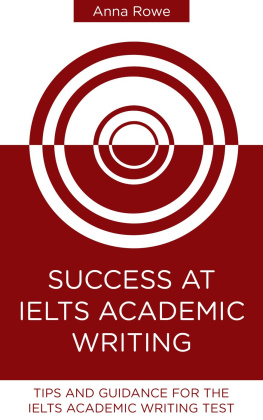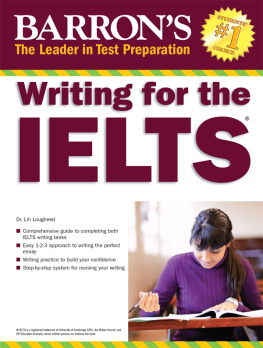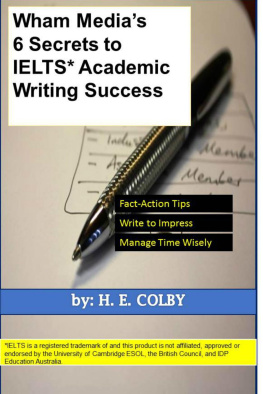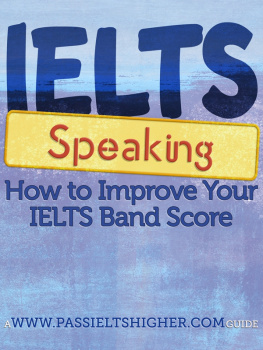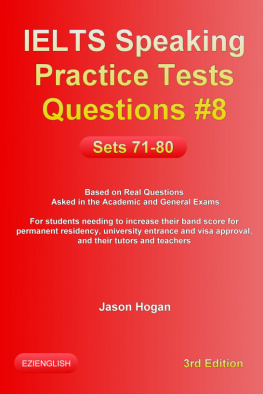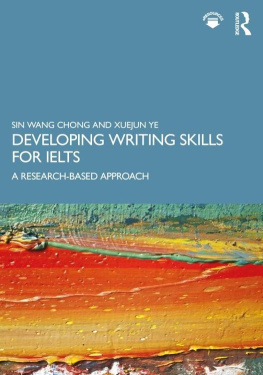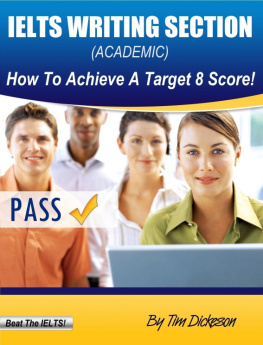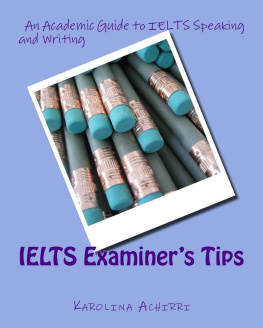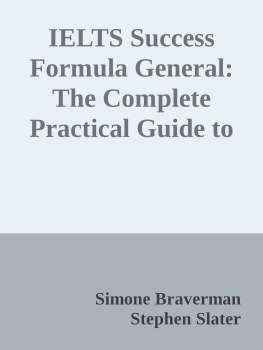Success at IELTS Academic Writing
Anna Rowe
Published by Anna Rowe, 2016.
While every precaution has been taken in the preparation of this book, the publisher assumes no responsibility for errors or omissions, or for damages resulting from the use of the information contained herein.
SUCCESS AT IELTS ACADEMIC WRITING
First edition. January 25, 2016.
Copyright 2016 Anna Rowe.
ISBN: 978-1524240677
Written by Anna Rowe.
10 9 8 7 6 5 4 3 2 1
Dear Reader
Welcome! I assume youre reading this book because youre preparing for the IELTS Academic Test. Writing is one of the four key components and for many students its a particularly difficult part of the test. However, its a crucial skill particularly if youre applying to university in an English-speaking country. But dont worry; this book is here to help you. Ive written this guide to help you find out what is important in the IELTS Academic Writing test and what you need to do in order to achieve a great band score. Work your way through this book, if necessary with the help of a good dictionary. Complete the exercises exactly how I ask you to complete them. Dont cheat yourself, but work hard on your answers and you will see progress.
The book is divided into three sections:
Tips : This is where youll find answers to many questions Ive been asked over the years by students. Ive also outlined common mistakes students make and how you can avoid them. Its a good idea to read this section before you start on the guided practice questions.
Guided practice questions : There are six guided practice questions in this book, covering all question types in the IELTS Academic Writing test. Its best to do them in order.
Sample answers : When you have completed a guided practice question, compare it to the sample answer. This will help you assess your own work. Its a good idea to edit your original answer at this stage and see how you can improve it. All sample answers would achieve a band 8.5 or higher in IELTS, so if yours isnt quite as good, you may still be able to achieve the band you were hoping for.
I hope you enjoy this book and find it useful. Good luck with your exam!
Anna
Contents
Tips for IELTS Academic Writing
Format of the Writing test
T he Writing test is 1 hour long and will come after the Listening and Reading tests. Theres sometimes a break between the tests and you might be able to get a coffee or have a few moments in the fresh air. Ask your test centre about it. Psychologically, its always a good idea to know exactly how the day will run and your test centre should be able to give you exact information on how they administer the test.
Within the 60 minutes you have to answer two questions. You need to divide your time however you see fit. However, bear in mind that Task 1 is shorter than Task 2, so you probably need to allow around 15-20 minutes for Task 1 and 40-45 minutes for Task 2. Task 1 is worth 1/3 of the marks and Task 2 is worth 2/3 of the marks.
In Task 1 you will have to describe and interpret visual information, for example a graph or a diagram.
In Task 2 you need to discuss a problem, point of view or argument.
We will look at both tasks in detail in the Guided Practice section.
Word count
T he word count is clearly stated on your test, so you dont need to memorise it, but you will need it to practise. You are expected to write at least 150 words for Task 1 and at least 250 words for Task 2, so in total you will have to write at least 400 words in 60 minutes.
In order to do well in the test, youll need to know how much space 150 and 250 words take up in your handwriting. You wont have time to count words in your test, so simply count a few of your practice essays and see how many pages youll have to write. The test paper is lined A4 paper. Use similar paper for your practice and youll know exactly what you have to aim for.
Many students get very worried about the word count, but you really shouldnt. Youll need to write a minimum of 150 words or 250 words in order to give a full answer. Anything less than that and youre probably missing a lot of important points. Many students have the opposite problem. They would find it really easy to write too many words. You will not lose marks if you write a longer answer, but you dont have much time in the test. Its also really important that you check your work at the end. So train yourself to be concise. Its good practice, not just for the exam, but also for life.
British English/American English/slang
S tudents sometimes worry about whether they should be using British or American English. The truth is, it doesnt matter. Depending on where youve learned English, you may well be using a mixture of both or you may be using a more international English. Thats all fine. However, you should be consistent in your spelling. If you spell organize in the American way ending in -ize , you should also spell recognize that way. If you spell centre the British way ending in -re , you should also spell theatre that way. But you can use organize (American English) and theatre (British English) in the same essay. Just remain consistent within each spelling rule.
Students ask me about slang all the time. They are worried that the assessors might not know it. The truth is, the assessors will most likely know the slang, but in the test slang is not appropriate in any of the tasks. You typically have to write in a formal, semi-formal or neutral style, so avoid all slang.
Timing
T his is one of the hardest issues for most students. You have a lot to do in one hour. It will help you to have a clear strategy about how you will spend your time. Heres a suggested outline feel free to adapt it to make it work for you.
Task 1
Read the instructions and look at the visual information. Highlight the information in the graph or diagram you want to include in your answer (2-3 minutes).
Write your answer (10-15 minutes).
Check your answer (2-3 minutes).
Task 2
Read the instructions carefully. (2-3 minutes)
Make a quick essay plan (in your head or on paper) to decide how you will present your argument, point of view or solution. (3-5 minutes)
Write your essay. (20-25 minutes)
Check your essay. (5-15 minutes)
Marking
T he examiners are looking at four key areas in your written answers. These areas are content, communicative achievement, organisation and language.
Task achievement and response
The examiners check whether you have done what you were asked to do. For example, have you written an essay about childhood obesity and its causes and possible solutions, as you were asked in the question? Did you write a minimum of 250 words and did you answer the question fully?
Coherence and cohesion
The examiners think about whether your writing is logical and reads easily. Are your ideas in a sensible order? Is it clear whether something is a new argument, a counterpoint or an example?
Lexical resource
The examiners want to see you use a wide range of vocabulary. This includes accurate spelling.
Grammatical range and accuracy
The examiners want to see a high level of grammar used accurately. This includes punctuation.
Practicalities
Y ou can write your answer in pen or in pencil. Youll have the question paper in front of you as well as the answer sheet. The examiners only look at what youve written on the answer sheet, so make sure you write on the answer sheet not the question paper! The answer sheet is lined A4 paper. I recommend that you write on alternate lines, leaving one line blank in between each line you write on. That way, you can easily cross out a word or part of the text and write the corrected version above it. The examiners are used to crossed out sentences and amendments on the text and they are adept at reading different handwriting.

